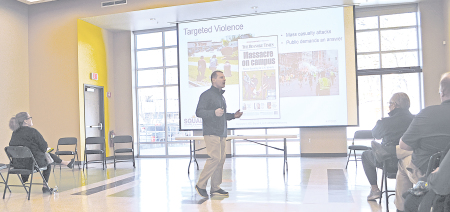Incompetent Defense: Ramsaran Granted Retrial Over Wife's Murder
Published:
October 17th, 2022
By:
Tyler Murphy
 Ganesh R. Ramsaran following a court appearance in 2019. He was convicted in 2014 of murdering his wife but was recently granted a retrial after the court determined his defense lawyer was incompetent. (Photo by Tyler Murphy)
Ganesh R. Ramsaran following a court appearance in 2019. He was convicted in 2014 of murdering his wife but was recently granted a retrial after the court determined his defense lawyer was incompetent. (Photo by Tyler Murphy)
NORWICH – In 2014, Ganesh R. Ramsaran was convicted in Chenango County Court of murdering his wife, and now following an 8-year-long appeals process, the same court ruled this month he should be granted a retrial due to incompetent and unethical behavior by his private defense attorney at the time.
Ramsaran had been sentenced to 25 years to life in prison.
He was convicted by a jury on Sept. 23, 2014, for the murder of of wife, Jennifer. Investigators said Ramsaran murdered his wife on the morning of Dec. 11, 2012 because he was having an affair and wanted to collect insurance money.
The discovery of Jennifer's body and his arrest came several months later and much of the case rested on forensic evidence.
Following a 2020 hearing and following review by Chenango County Court Judge Frank B. Revoir Jr., the court recently ruled in favor of Ramsaran's appellate lawyers, Melissa K. Swartz and David J. Hammond, who argued Ramsaran never received a fair trail because his lawyer at the time, Gil Garcia, was not qualified or experienced.
“To take $100k from this family and do nothing while he is being crucified – it's about the justice system, not guilt or innocence. Guilt or innocence comes later, we are talking about a bad process first,” Swartz told the court in September 2020.
When she first heard about the murder case she said her response was, “There is no way a bankruptcy attorney from New Jersey, who never tried a misdemeanor, should be coming here to try the gravest of offenses possible. I thought it was a prank, it is absurd.”
Swartz said Ramsaran has always maintained his innocence, but stressed the issue they were asking the court to look at was about a fair process and not guilt or innocence.
“Honestly, this case is a hard tilt. In a small area with so many beliefs and assumptions, hearsay and rumors, building and building, it becomes a tough pill to swallow,” said Swartz of changing people's perception of the case.
The attorneys pointed to several issues in the case they thought deserved further explanation at the hearing.
They offered a scathing assessment of Ramsaran's trial attorney, Garcia, calling his defense incompetent and exploitative.
In the court's decision Revoir wrote, “There was nothing remotely truthful to the assertion Attorney Garcia concentrated in the field of criminal litigation, when his criminal litigation experience was all from nearly twenty years or more ago. It was nothing but blatant dishonesty to claim criminal litigation experience when he had not even tried a misdemeanor case. Yet this fraud was intentionally perpetrated upon the Court.”
The judge also pointed out a Disciplinary Review Board in New Jersey had also found the record supported a finding that Attorney Garcia made false representations to Mr. Ramsaran about his experience with murder cases.
“Attorney Garcia admitted he was censured by the Supreme Court of New Jersey for those ethical violations,” wrote Revoir.
“First, this Court makes a finding Attorney Garcia has no credibility. Not only did the aforementioned acts demonstrate his willingness to do and say anything to achieve his goals, his testimony at the hearing was blatantly tailored to serve his purposes. As noted above, if the answers to any questions potentially portrayed Attorney Garcia in a negative light, he either feigned a lack of recollection, or alternatively, he characterized his actions as mere regrettable mistakes. He even characterized his blatant lies made during judicial proceedings as mistakes.”
The court also ruled, “As to the issue of retaining experts, the Court discredits Attorney Garcia's assertion the Defendant knew and agreed there would be no defense experts utilized or retained.
“Attorney Garcia would have the Court believe that after having retained an extraordinarily experienced and well seasoned criminal defense attorney, who had secured the services of multiple experts who had provided promising preliminary information, the Defendant then decided to knowingly retain the services of an attorney with no criminal defense litigation experience, no knowledge of New York's criminal laws, no knowledge of the underlying scientific and forensic issues relevant to the pending homicide case, and also agreed and decided to have no defense experts.
“It is preposterous to suggest the entire $100,000.00 fee (plus an additional $21,500.00 paid during the trial) was to be applied solely towards Attorney Garcia's legal fees. Utilizing no experts in defense of a case based entirely upon circumstantial evidence, a significant portion of which involved complex scientific and forensic data, benefits only one person -and that beneficiary is not Attorney Garcia's client.”
In conclusion Revoir wrote, “Under the totality of these facts and circumstances, the Court must find Attorney Garcia did not provide the reasonably competent services of an attorney devoted to the client's best interests.”
“Based upon the foregoing, Defendant's motion is granted. Defendant's conviction is vacated and a new trial is ordered.”
Author: Tyler Murphy - More From This Author
Comments








